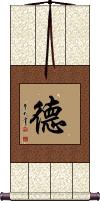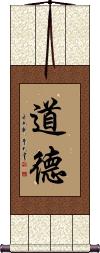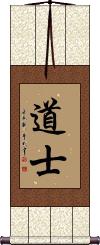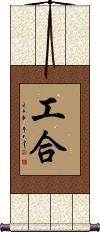Many custom options...
And formats...

Morals in Chinese / Japanese...
Buy a Morals calligraphy wall scroll here!
Personalize your custom “Morals” project by clicking the button next to your favorite “Morals” title below...
Moral and Virtuous
德 is the simple way to express the ideas of having virtue, morals, kindness, benevolence, goodness, etc.
德 also happens to be the first character of the Chinese word for Germany.
![]() There is a slight deviation in the Japanese Kanji form. If you want the modern Japanese version, please click on the special Kanji shown to the right instead of the button above. Note that the traditional Chinese form is still readable and understood by Japanese people.
There is a slight deviation in the Japanese Kanji form. If you want the modern Japanese version, please click on the special Kanji shown to the right instead of the button above. Note that the traditional Chinese form is still readable and understood by Japanese people.
See Also: Ethics | Chastity | Prudence | Benevolence | Morality
Ethics / Ethical / Morality
道德 is a Chinese, Japanese, and old Korean word that can also be defined as “moral principles,” morality, ethics, ethical, morals, or virtue.
The first character is the same that is associated with Daoism / Taoism. This word is also used to express morality, virtue, or simply morals.
![]() There is a slight deviation in the Japanese Kanji form. If you want the modern Japanese version, please click on the special Kanji shown to the right instead of the button above. Note that the traditional Chinese form is still readable and understood by Japanese people.
There is a slight deviation in the Japanese Kanji form. If you want the modern Japanese version, please click on the special Kanji shown to the right instead of the button above. Note that the traditional Chinese form is still readable and understood by Japanese people.
Taoist / Daoist
道士 is a Japanese Kanji, Korean Hanja, and Chinese title that means Daoist or Taoist.
This can refer to a Taoist priest or a person of high morals. This can also be applied to Buddhists and Śākyamuni (especially in Japanese). It suggests a person (or soldier) who follows the way or the right path. Thus a person who follows a path of virtue.
Gung Ho
Working Together
工合 is one of those Asian words that is used more in English than in the original Chinese.
Gung Ho was originally used to speak of Carlson's Raiders, a group of “Gung Ho” U.S. Marines who went on an island-hopping campaign of death during WWII.
A movie called Gung Ho came out in the mid-1940s and was later re-released in the 1950s depicting the 2nd Marine Raider Battalion, and brought this word to the mainstream.
It is still sometimes used today within the U.S. Marine Corps brotherhood to refer to a unit or group that works well together or is otherwise efficient and motivated (has good morals).
In 1986, there was a movie called Gung Ho about a Japanese company taking over an American automotive factory. They completely ignored the fact that this was a Chinese title.
It should be noted that this title actually means a condition, state, manner, or the health of something in Japanese.
Language and pronunciation notes:
Like many Asian words absorbed into common use in English, this one is drastically mispronounced. The official Romanization is “gong he” but that doesn't tell you enough. The vowel sound on the first character is like the English word “own,” now just add the g-sounds to the beginning and end. The second character is misleading, as you might think it is like the English word “he.” In reality, the vowel sound is more like the “u” in “up.”
It should also be noted that the current generation in China no longer uses or recognizes this as a common word or slogan.
Note: This can be pronounced and is a word in Japanese, though seldom used. Japanese will use a variation of "具合" instead. But still, not common.
Not the results for morals that you were looking for?
Below are some entries from our dictionary that may match your morals search...
| Characters If shown, 2nd row is Simp. Chinese |
Pronunciation Romanization |
Simple Dictionary Definition |
慧 see styles |
huì hui4 hui megumi めぐみ |
More info & calligraphy: Wisdom / Intelligence(1) wisdom; enlightenment; (2) (Buddhist term) prajna (one of the three divisions of the noble eightfold path); wisdom; (female given name) Megumi prajñā ; sometimes jñāna. Wisdom, discernment, understanding; the power to discern things and their underlying principles and to decide the doubtful. It is often interchanged with 智, though not correctly, for zhi means knowledge, the science of the phenomenal, while hui refers more generally to principles or morals. It is part of the name of many monks, e.g. 慧可 Huike; 慧思Huisi. |
道士 see styles |
dào shì dao4 shi4 tao shih doushi / doshi どうし |
More info & calligraphy: Taoist / Daoist(1) Taoist; (2) person of high morals; (3) Buddhist monk; (4) immortal mountain wizard; Taoist immortal; (personal name) Michishi A Taoist (hermit), also applied to Buddhists, and to Śākyamuni. |
毐 see styles |
ǎi ai3 ai |
see historical character Lao Ai 嫪毐; by extension, person of reprehensible morals; immoral; adulterer |
世道 see styles |
shì dào shi4 dao4 shih tao toshimichi としみち |
the ways of the world; the morals of the time (personal name) Toshimichi worldly ways |
世風 世风 see styles |
shì fēng shi4 feng1 shih feng |
public morals |
信戒 see styles |
xìn jiè xin4 jie4 hsin chieh shinkai |
Faith and morals, i.e. the moral law, or commandments; to put faith in the commandments. |
修身 see styles |
xiū shēn xiu1 shen1 hsiu shen shuushin / shushin しゅうしん |
to cultivate one's moral character; (fashion) slim-fit; body-hugging morals; ethics; moral training; (personal name) Masami self-cultivation |
倫理 伦理 see styles |
lún lǐ lun2 li3 lun li rinri りんり |
ethics ethics; morals; (female given name) Rinri ethics |
公徳 see styles |
koutoku / kotoku こうとく |
public morality; social morals; civic virtues; (given name) Tadanori |
善戒 see styles |
shàn jiè shan4 jie4 shan chieh zenkai |
good morals |
四取 see styles |
sì qǔ si4 qu3 ssu ch`ü ssu chü shishu |
catuḥ-parāmarśa, the four attachments, i. e. desire, (unenlightened) views, (fakir) morals, and ideas arising from the conception of the self. Also, the possible delusions of the 四住地. Also, seeking fame in the four quarters. |
四執 四执 see styles |
sì zhí si4 zhi2 ssu chih shishū |
The four erroneous tenets; also 四邪; 四迷; 四術; there are two groups: I. The four of the 外道 outsiders, or non-Buddhists, i. e. of Brahminism, concerning the law of cause and effect: (1) 邪因邪果 heretical theory of causation, e. g. creation by Mahesvara; (2) 無因有果 or 自然, effect independent of cause, e. g. creation without a cause, or spontaneous generation; (3) 有因無果 cause without effect, e. g. no future life as the result of this. (4) 無因無果 neither cause nor effect, e. g. that rewards and punishments are independent of morals. II. The four erroneous tenets of 內外道 insiders and outsiders, Buddhist and Brahman, also styled 四宗 the four schools, as negated in the 中論 Mādhyamika śāstra: (1) outsiders, who do not accept either the 人 ren or 法 fa ideas of 空 kong; (2) insiders who hold the Abhidharma or Sarvāstivādāḥ tenet, which recognizes 人空 human impersonality, but not 法空 the unreality of things; (3) also those who hold the 成實 Satyasiddhi tenet which discriminates the two meanings of 空 kong but not clearly; and also (4) those in Mahāyāna who hold the tenet of the realists. |
多情 see styles |
duō qíng duo1 qing2 to ch`ing to ching tajou / tajo たじょう |
affectionate; passionate; emotional; sentimental (noun or adjectival noun) (1) profligate; licentious; of loose morals; amorous; (noun or adjectival noun) (2) emotional; passionate; sentimental |
婬婦 see styles |
inpu いんぷ |
(1) woman of loose morals; lewd woman; (2) prostitute; whore; harlot |
尻軽 see styles |
shirigaru しりがる |
(noun or adjectival noun) (1) loose; promiscuous; unfaithful; wanton; of loose morals; (noun or adjectival noun) (2) quick; brisk; energetic; active; (noun or adjectival noun) (3) rash; thoughtless; careless |
履む see styles |
fumu ふむ |
(transitive verb) (1) to step on; to tread on; (2) to experience; to undergo; (3) to estimate; to value; to appraise; (4) to rhyme; (5) (archaism) to inherit (the throne, etc.); (6) to follow (rules, morals, principles, etc.) |
常理 see styles |
cháng lǐ chang2 li3 ch`ang li chang li |
common sense; conventional reasoning and morals |
徳治 see styles |
tokuchi とくち |
virtuous government; government founded on good morals; (given name) Michiharu |
徳義 see styles |
tokugi とくぎ |
morals; morality; sincerity; (male given name) Noriyoshi |
淫婦 淫妇 see styles |
yín fù yin2 fu4 yin fu inpu いんぷ |
loose woman; prostitute; Jezebel (1) woman of loose morals; lewd woman; (2) prostitute; whore; harlot |
淫蕩 淫荡 see styles |
yín dàng yin2 dang4 yin tang intou / into いんとう |
loose in morals; lascivious; licentious; lewd (noun or adjectival noun) (form) debauchery; dissipation; lewdness; lasciviousness |
狗戒 see styles |
gǒu jiè gou3 jie4 kou chieh kukai |
Dog-rule, dog-morals, i.e. heretics who sought salvation by living like dogs, eating garbage, etc. |
矯風 see styles |
kyoufuu / kyofu きょうふう |
reform of morals |
私徳 see styles |
shitoku しとく |
(rare) (See 公徳) personal morals; personal virtues |
綱常 see styles |
koujou / kojo こうじょう |
code of morals; moral principles; (personal name) Tsunahisa |
践む see styles |
fumu ふむ |
(transitive verb) (1) to step on; to tread on; (2) to experience; to undergo; (3) to estimate; to value; to appraise; (4) to rhyme; (5) (archaism) to inherit (the throne, etc.); (6) to follow (rules, morals, principles, etc.) |
踏む see styles |
fumu ふむ |
(transitive verb) (1) to step on; to tread on; (2) to experience; to undergo; (3) to estimate; to value; to appraise; (4) to rhyme; (5) (archaism) to inherit (the throne, etc.); (6) to follow (rules, morals, principles, etc.) |
逆倫 逆伦 see styles |
nì lún ni4 lun2 ni lun |
unnatural relationship (parricide, incest etc); unfilial conduct; against social morals |
道徳 see styles |
doutoku / dotoku どうとく |
morals; morality; (given name) Michinori |
風俗 风俗 see styles |
fēng sú feng1 su2 feng su fuuzoku(p); fuuzoku / fuzoku(p); fuzoku ふうぞく(P); フーゾク |
social custom; CL:個|个[ge4] (1) manners; customs; (2) public morals; (3) sex service; sex industry; sex-oriented entertainment customs |
Click here for more morals results from our dictionary
The following table may be helpful for those studying Chinese or Japanese...
| Title | Characters | Romaji (Romanized Japanese) | Various forms of Romanized Chinese | |
| Moral and Virtuous | 德 徳 | toku | dé / de2 / de | te |
| Ethics Ethical Morality | 道德 道德 / 道徳 | dou toku / doutoku / do toku | dào dé / dao4 de2 / dao de / daode | tao te / taote |
| Taoist Daoist | 道士 | dou shi / doushi / do shi | dào shì / dao4 shi4 / dao shi / daoshi | tao shih / taoshih |
| Gung Ho | 工合 | guai | gōng hé / gong1 he2 / gong he / gonghe | kung ho / kungho |
| In some entries above you will see that characters have different versions above and below a line. In these cases, the characters above the line are Traditional Chinese, while the ones below are Simplified Chinese. | ||||
Successful Chinese Character and Japanese Kanji calligraphy searches within the last few hours...







